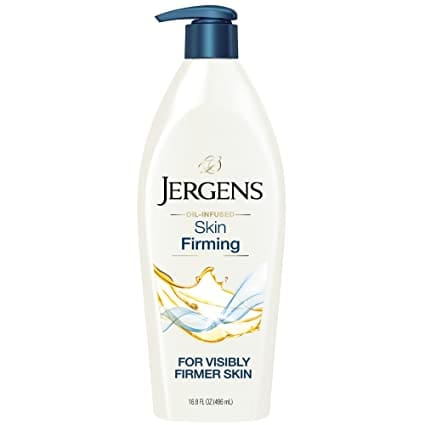Introduction to Science of Skincare
The quest for healthy, youthful-looking skin often leads us to explore the world of skincare ingredients, treatments, and techniques. Two key proteins that play a significant role in maintaining skin’s appearance and health are collagen and elastin. In this article, we’ll dive into the science behind these proteins, their roles in the skin, and how to support their synthesis for radiant, supple skin.

Featured Product: Jergens Skin Firming Body Lotion
Revitalize your skin with our recommended product: Jergens Skin Firming Body Lotion for Dry to Extra Dry Skin. This skin-tightening cream is specially formulated with collagen and elastin to target both the proteins responsible for youthful, firm, and supple skin.
Enriched with Jergens’ unique Hydralucence Blend Formula, this lotion provides instant hydration to dry skin, leaving it visibly smoother and healthier. Dermatologist tested and approved, Jergens Skin Firming Body Lotion is your go-to solution for improving skin elasticity and combating dryness.
Don’t wait to give your skin the care it deserves! Shop now and experience the benefits of Jergens Skin Firming Body Lotion for yourself.
Collagen: The Skin’s Support System
Definition and Role
Collagen is a structural protein that provides the framework for our skin, as well as other tissues such as tendons, ligaments, and bones. In the skin, collagen forms a network of fibers that give the skin its strength and firmness, helping to maintain a smooth, plump appearance.
Production and Types
Collagen is produced by specialized cells called fibroblasts, which synthesize and secrete collagen molecules. These molecules then assemble into fibers that form a network within the dermis, the middle layer of the skin. There are several types of collagen, but the most abundant in the skin are Type I, II, and III. Type I collagen provides the majority of the skin’s tensile strength, while Type III collagen is more commonly found in younger skin and plays a role in skin elasticity.
Collagen and Aging
As we age, our bodies produce less collagen, leading to a gradual decline in skin firmness and an increase in the appearance of fine lines and wrinkles. In addition, environmental factors such as sun exposure, pollution, and smoking can cause collagen breakdown, further contributing to skin aging.
Boosting Collagen Production
To support collagen production and maintain skin health, consider incorporating the following strategies:
- Use skincare products containing ingredients known to stimulate collagen production, such as retinol, vitamin C, or peptides.
- Consume a diet rich in collagen-boosting nutrients, such as vitamin C, amino acids, and antioxidants.
- Adopt healthy lifestyle choices, like protecting your skin from excessive sun exposure, avoiding smoking, and managing stress.
Elastin: The Secret to Skin Elasticity
Definition and Role
Elastin is a fibrous protein that gives the skin its elasticity, allowing it to stretch and return to its original shape after being pulled or compressed. This quality is crucial for maintaining the skin’s resilience and youthful appearance.
Elastin Production
Elastin production occurs in fibroblasts, much like collagen. During elastogenesis, elastin molecules are secreted by fibroblasts and cross-linked into a network of fibers. Once formed, elastin is highly stable and has a slow turnover rate, meaning it takes a long time for the body to replace damaged or degraded fibers.
Elastin and Aging
Over time, elastin production decreases, and existing fibers become less functional, resulting in a loss of skin elasticity. Factors such as sun exposure, smoking, and pollution can further accelerate elastin degradation, leading to premature skin aging.
Enhancing Elastin Production
To support elastin production and improve skin elasticity, try the following strategies:
- Use skincare products containing ingredients that stimulate elastin production or protect existing fibers, such as peptides or antioxidants.
- Consume a diet rich in nutrients that support elastin synthesis, like vitamin A, copper, and essential fatty acids.
- Engage in regular exercise and practice stress-management techniques to promote overall health and well-being.
The Relationship Between Collagen and Elastin
Collagen and elastin work in harmony to maintain the skin’s health and appearance. While collagen provides the strength and structure, elastin ensures flexibility and resilience. Supporting the production and functionality of both proteins is essential for maintaining youthful, healthy skin.
Skincare Ingredients That Target Collagen and Elastin
To promote collagen and elastin production, consider incorporating the following ingredients into your skincare routine:
- Retinol: A derivative of vitamin A that stimulates collagen production and improves skin texture.
- Peptides: Small chains of amino acids that can signal the skin to produce more collagen and elastin.
- Vitamin C: An antioxidant that supports collagen synthesis and helps protect the skin from environmental damage.
- Niacinamide: A form of vitamin B3 that can improve skin elasticity and reduce the appearance of fine lines and wrinkles.
- Hyaluronic Acid: A naturally occurring substance in the skin that helps retain moisture, promoting a plump, hydrated appearance.
Conclusion
Understanding the science behind collagen and elastin is essential for maintaining healthy, youthful skin. By supporting the synthesis of these proteins through informed skincare choices and healthy lifestyle habits, you can help preserve your skin’s firmness, elasticity, and radiance for years to come.
Related Articles
If you enjoyed “The Science of Skincare: Understanding Collagen and Elastin,” you might also like these related articles:
- How to Boost Elastin Production for Firmer, More Youthful Skin
- 7 Antioxidant Foods For Glowing Skin
- How to Choose the Right Antioxidant Serum for Your Skin Type
- How To Develop Your Mind-Body To Optimal Health Now!
- How to Incorporate Retinol Into Your Skincare Routine
- Glossary Term: Anti-aging
Explore these articles to gain further insights into skincare, antioxidants, and maintaining optimal skin health.
